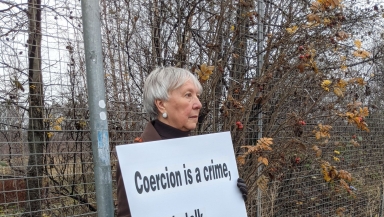
The Procurator Fiscal in Scotland has decided not to prosecute a 75-year-old grandmother arrested earlier this year for holding a sign that offered a listening ear to women visiting an abortion clinic.
The Alliance Defending Freedom International (ADF), which has been assisting Rose Docherty since her arrest, called it "a win for freedom of expression in Scotland".
Docherty was arrested on 19 February as she stood peacefully within an abortion clinic buffer zone near the Queen Elizabeth II Hospital in Glasgow.
Her sign read “Coercion is a crime, here to talk, only if you want".
The buffer zone around the hospital prohibits harassment, intimidation, or influencing decisions about abortion.
Docherty has always maintained that her presence in the buffer zone and the words on her sign did not contravene any of these restrictions.
Nonetheless she was arrested and later offered a formal warning in exchange for admitting to wrongdoing and promising to refrain from similar actions in the future.
Her arrest drew criticism at the time from the US State Department which said on social media: “Freedom of expression needs to be protected. We call on governments, whether in Scotland or around the world, to respect freedom of expression for all.”
Welcoming the news that she will not be prosecuted, Docherty said, "This is a victory not just for me, but for everyone in Scotland who believes we should be free to hold a peaceful conversation."
The authorities have also promised that her sign will be returned to her by Police Scotland.
She added, “I stood with love and compassion, ready to listen to anyone who wanted to talk. Criminalising kindness has no place in a free society.”
Lorcan Price, legal counsel for ADF International, welcomed the development.
“No one should fear arrest for offering a consensual conversation. Rose’s case is a stark example of how ‘buffer zone’ laws can be weaponised to silence peaceful expression," he said.
“We are relieved that common sense has prevailed, but the fact that Rose was arrested and threatened with prosecution shows the urgent need to protect fundamental freedoms in Scotland.”













